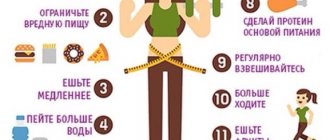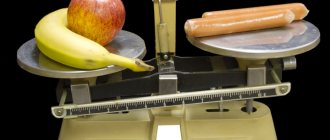According to various estimates, about 20% of people who lose weight by changing their diet maintain optimal weight. The remaining 80% face a problem: the lost pounds return, and they have to look for new ways to achieve a slim figure. Moreover, regaining excess weight is the minimum difficulty that can be encountered after a dietary shake-up. Because often the lost weight is not only restored, but also increased. Why does this happen, and are there any diets after which the weight does not return?
Reasons for weight gain after dieting
A sharp reduction in calorie intake or a change in menu is stressful for the body. Studies have shown that you can reduce your caloric intake by no more than 20% without harming your health. Even if you suddenly eat a surprising amount, suddenly cutting your menu in half will stress your body and lead to problems. That is, you should change your eating habits carefully, gradually, and carefully.
However, in pursuit of a beautiful figure, especially when the need to “fit into” their favorite dress looms ahead, many women strive to lose weight quickly. They resort to mono-diets, severe dietary restrictions, and even real hunger strikes. An exhausted body really begins to lose kilograms, although not due to fatty tissue, but due to water and muscles. But, since the result is noticeable on the scale, and the coveted dress fits the figure, women consider such ways to quickly lose weight effective.
In practice, exhaustion of the body is extremely harmful. The body remembers periods of such sudden weight loss as times of hunger and stores adipose tissue in case force majeure occurs again. That is, the lost kilograms are rapidly restored, and the body begins to resist their loss with all its might, because nutritious, energetically valuable fat can be useful during the next “hunger period”. Thus, the desire to lose weight contributes to the gain of excess body weight.
But even if you do not abuse fasting and mono-diets, there may be other reasons why you cannot maintain optimal body weight.
Calorie foods
So, you gave up high-calorie foods for a couple of weeks or even months, and gained a slim figure. Everything is fine, the diet period is over, you can return to old habits. This is the most common mistake people make when trying to lose weight.
If you've lost pounds by cutting out high-calorie foods, once they're back in your diet, you'll start to gain weight again. A diet that doesn't cause weight gain is one that you can stick to consistently, with minor adjustments. It is impossible to eat hamburgers and drink cola every day and maintain optimal body weight. Unless you compensate for this with some kind of physical activity at the level of a professional athlete. However, even daily exercise does not help everyone normalize body weight without nutritional correction.
Metabolic slowdown
It can occur for various reasons, including the one we described above: the body’s physiological response to hunger. Our body is “sharpened” not for compliance with the canons of beauty, but for survival, so it can slow down its metabolism if you periodically stress it in the form of a sharp reduction in calories. But there may be other reasons:
- diseases of the endocrine system;
- a sharp decrease in physical activity;
- taking certain medications with similar side effects;
- regular lack of sleep.
Loss of motivation and willpower
Another common reason why you can’t maintain a slim figure is lack of discipline. Let's say you balanced your diet, consulted with a nutritionist, signed up for a gym, and everything is going great. But from time to time you want to return to old habits: drinking beer instead of jogging, tasting sweets instead of the gym, and replacing salads with hearty, aromatic sweet pastries.
To fight temptation, allow yourself such weaknesses, but very carefully. Plan ahead for these little treats. However, eat baked goods once a week and in the morning, and not every day and in the evening. If you feel tired, allow yourself to relax with your favorite TV series, reschedule your sports training for tomorrow (but not for a period like “in a month”). Of course, you should give up alcohol so as not to gain excess weight again, but a glass of dry red wine on Saturday evening will not hurt, and at the same time you will not feel that you have been deprived of all the joys of life.
Please note that if you eat and cannot stop, if, having eaten enough, you feel guilty and avoid eating in front of other people, then this is not a problem with willpower. This is how eating disorders manifest themselves. They also happen to very disciplined, strong-willed people. Only a qualified psychiatrist-psychotherapist who specializes in the treatment of eating disorder will help to cope with this problem.
Calorie deficit
Paradoxically, trying to eat less can backfire. The fact is that if you don't get enough nutrients during breakfast, lunch, dinner and afternoon snacks, then you will constantly want to eat. Hands themselves reach for candy, sandwiches, snacks, which seem to be a “snack” and “do not count.” For the same reason, you may eat at night, because hunger prevents you from sleeping, or you simply are not able to withstand the new diet for long enough. Remember, you can only reduce your caloric intake by 20%, otherwise the body will perceive the changes as stress.
Rational rate of weight loss
It is well known that after an effective fashion diet, weight returns, and often increases. This is due to the fact that a sharp restriction of the diet is unusual for the body: the body decreases in size, because less building material is supplied, metabolic processes slow down, and energy consumption decreases. But once you achieve the desired results and return to your previous eating habits, the extra pounds return. Elena Mikhailovna Zelenskaya, a general practitioner, nutritionist, junior researcher at the Laboratory of Personalized Medicine at the Institute of Chemical Biology and Medicine of the SB RAS, told us
The process of weight gain after dietary restriction is natural and predictable, since for centuries a person has developed in conditions of food shortage. This led to the fact that among our ancestors, only those who quickly accumulated mass in good times survived, so as not to die later in hungry times.
The body perceives an artificially organized diet as another “hunger year”, and after the end of the diet it begins to gain weight intensively, because it feels that hunger will most likely come again. Thanks to this unique property, our ancestors, during the course of evolution, gained an advantage over those who gained weight slowly, so they survived, while their “slender” brothers died of exhaustion, leaving no offspring.
Thus, in order not only to reduce weight, but also to effectively maintain it, you need to follow two rules:
- change the diet slowly so that the mechanisms of active storage of adipose tissue do not turn on;
- change your diet for a long time (several years), ideally forever.
A relatively healthy person may not limit himself to a variety of foods; he only needs to adjust the amount and time of intake (for example, consume sweet foods mainly in the morning rather than in the evening).
According to various sources, optimal weight loss through diet occurs by 0.7–1 kg per week or 2–4 kg per month, without the risk of gaining it again at the slightest error in nutrition.
If you lose weight due to physical activity, you must remember that when the amount of adipose tissue decreases, muscle mass increases, which is heavier than adipose tissue. Therefore, at some point the weight will remain in place, and unnecessary volumes will go away. In this case, it is better to monitor changes in waist and hip measurements, rather than weight.
A nutritionist develops a diet for each individual patient, depending on his state of health.
Until recently, nutritional services existed only in hospitals, and its main purpose was to correct the nutrition of seriously ill patients. In recent years, the situation has changed, and consultation with a nutritionist is recommended not only for severe conditions, but also for any patient who wants to adjust body weight, especially in the presence of chronic diseases.
You may benefit from consulting a nutritionist if:
- you would like to lose weight;
- you would like to gain muscle mass;
- you periodically experience nausea, heartburn, flatulence, and bowel movements;
- you have a chronic disease (diseases of the gastrointestinal tract, diabetes mellitus, coronary heart disease, osteoporosis, gout or another) that you would like to control not only with medications, but also with a healthy diet;
- you want to learn more about healthy eating.
What can you learn by visiting a nutritionist?
- How much protein, fat and carbohydrates per day do you need?
- How many kilocalories does your body need in a state of complete rest (sleep) and taking into account your physical activity, and also what amount of kilocalories is optimal for losing weight or gaining muscle mass?
- Why does weight come back and how to prevent it?
- Using your food diary, your dietitian can help you identify eating habits that may be preventing you from losing weight.
- You can get complete information about the principles of healthy eating.
- Based on the test results, a nutritionist will help identify hidden causes of weight gain.
Thus, consulting a professional will help you lose weight at an adequate pace and not gain it back.
Diets after which the weight does not return
These are diets that you can stick to constantly, which seem satisfying, tasty and enjoyable. In other words, a diet after which the weight does not return is a balanced diet. Often it requires a complete restructuring of eating habits, giving up alcohol, limiting the consumption of sweet, fatty, spicy, mayonnaise and sauces from stores.
If you don’t want the extra pounds to return, then don’t chase quick results. Quickly lost kilograms come back just as quickly. The normal rate of weight loss is 0.5-3 kg per week. If you are healthy and lose 5-10 kg per week, then rest assured: these kilograms will return sooner or later.
Old habits
We decided to lose weight and gave up:
- sweet;
- flour;
- white dough;
- sweet drinks;
- overeating;
- passivity;
- junk food, fast food.
Don't go back to old habits. Let this be a thing of the past. After all, soda can be replaced with freshly squeezed juice, white can be replaced with integral bread, sweets with fruits and dried fruits. Even milk chocolate (yes, a lot of calories and sugar) is replaced with bitter chocolate, which is no less tasty.
Or it’s a big mistake to return to large portions after the body has become accustomed to small ones. There is good advice - take a smaller plate, because a small portion looks dull on a large one. And if you take a small one, even a small portion will look organic. This is a part of psychology, but it’s easier to get used to reducing the amount of food.
How to maintain weight after a diet
Follow a balanced diet, eat as little baked goods, sweets, fatty foods, and fried foods as possible. Don't forget to include fresh vegetables and fruits, salads, cereals, legumes, some nuts and berries in your daily menu.
Also try to maintain a comfortable level of physical activity. Sedentary work is harmful to health and contributes to weight gain, so choose a pleasant type of exercise for yourself: walking, running, swimming, gym. The main thing is that you move regularly. If your level of physical activity and diet remain stable, but your weight is growing rapidly: for example, 5 kilograms per month, despite the fact that your eating habits have not changed and you have not stopped walking or playing sports, consult a doctor. With a high degree of probability, the problem is not in your diet, but in your health.
Delivery of balanced nutrition | Delivery of healthy nutrition reviews | Healthy eating for the office | Moscow detox set | Fish program at home | Complex for weight loss | Nutrition for athletes with delivery Moscow | Vegetarian food at home Moscow
FROM TASTE DISTORTION TO REDUCED APPETITE
“It is known that with other severe infections people can lose weight. Are there any peculiarities of this process specifically during Covid?
- Yes. With COVID-19, all organs and systems are affected, including the nervous system and olfactory bulbs. Therefore, a person may experience an aversion to certain foods for a very long time, as his taste is distorted. And even in those who have had a mild form of Covid, this condition can persist for months. Due to decreased appetite, a person eats less. As a result, they do not receive sufficient nutritional support, which leads to a longer recovery period after illness,” says Dr. Omarova.
At the same time, according to the doctor, weight loss after Covid, as well as the recovery period, does not depend on age or gender. “Here there is rather a connection with the severity and duration of the disease. In addition, the individual characteristics of the body matter,” adds the expert.











